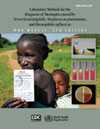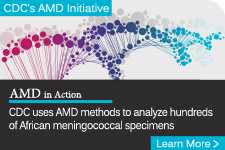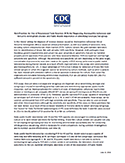Laboratory Information
CDC’s Bacterial Meningitis Laboratory works primarily on two pathogens: Neisseria meningitidis and Haemophilus influenzae. If you would like to find laboratory information about Streptococcus pneumoniae, please see the Streptococcus Laboratory site.
Overview
CDC’s Bacterial Meningitis Laboratory supports:
- Active, population-based surveillance for N. meningitidis and H. influenzae in an overall population base of more than 40 million people
- Enhanced meningococcal disease surveillance in 44 states and 3 large jurisdictions
- State and local health department laboratories that request assistance
- Outbreak investigations
- Specialized research projects related to N. meningitidis and H. influenzae
Laboratory surveillance data play a critical role in continuing efforts to combat bacterial meningitis pathogens in the United States. Laboratory data, together with isolates collected through surveillance programs, including Active Bacterial Core surveillance, serve as a valuable resource for outside researchers.
CDC’s Bacterial Meningitis Laboratory serves health departments throughout the United States in the characterization of N. meningitidis and H. influenzae isolates for surveillance, outbreak support, and other public health concerns. CDC’s Bacterial Meningitis Laboratory is also very active in laboratory capacity building and quality control internationally as the World Health Organization Collaborating Center for Meningitis. The lab is a well-recognized reference center for identification and characterization of N. meningitidis and H. influenzae.
In addition to surveillance and reference activities, the lab is actively involved with specialized research projects that have direct public health relevance, with numerous collaborators in academia and industry.
Reference Lab
CDC’s Bacterial Meningitis Laboratory can offer advice concerning laboratory procedures dealing with N. meningitidis and H. influenzae isolates. For clinicians and laboratorians who feel that their bacterial meningitis isolates have novel features with potential public health impact, the lab is glad to discuss ways to assist in characterizing these isolates. Report suspected outbreaks to state or local health departments.
Unfortunately, the lab does not have the resources to perform serogrouping/serotyping or other molecular characterization for all requests sent to CDC’s Bacterial Meningitis Laboratory. Therefore, requestors should discuss with the lab, in advance, the reason for the request so that the resources can be allocated to type those isolates that will answer the most pressing public health questions. An outbreak is one example of a situation in which rapid serogrouping/serotyping and molecular typing has immediate value.
The lab will provide serogrouping/serotyping or other tests only upon prior communication with a contact in CDC’s Bacterial Meningitis Laboratory (contact below) indicating the reason for this service.
If you have any questions, please feel free to contact us by calling 1-800-CDC-INFO or filling out a form and requesting to be put in touch with the Meningitis and Vaccine Preventable Diseases Branch.
Laboratory Methods for the Diagnosis of Meningitis

This manual summarizes laboratory techniques used in the isolation and identification and characterization of N. meningitidis (meningococcus), S. pneumoniae (pneumococcus) and H. influenzae from the cerebrospinal fluid or blood of patients with clinical meningitis or bacteremia.
Related Pages
- Meningococcal Genome Informatics Platform (MGIP)
Online computational analysis of MLST, OMPs, and other typing methods
- CDC Streptococcus Laboratory
- Page last reviewed: March 28, 2017
- Page last updated: March 28, 2017
- Content source:
- Content source: National Center for Immunization and Respiratory Diseases



 ShareCompartir
ShareCompartir
